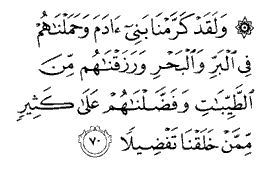Human Dignity, Dental Hygiene, The Dichotomy
Issue 801 » August 1, 2014 - Shawwal 5, 1435
Living The Quran
Human Dignity
Al-Isra (The Night Journey) - Chapter 17: Verse 70
 "We have conferred dignity on all the children of Adam; bore them over land and sea; given them sustenance from the good things of life; and conferred on them favours above a great part of our creation."
"We have conferred dignity on all the children of Adam; bore them over land and sea; given them sustenance from the good things of life; and conferred on them favours above a great part of our creation."
The Quran states that the dignity of the children of Adam has been conferred by God on them all, whatever their ethnicities and beliefs may be. Human "dignity" has a wider concept than human "rights", as "dignity" comprises the enjoyment of rights and the fulfillment of duties side by side. Dignity has been granted by God to all human beings since the creation, and thus it is inseparable from human nature in the Muslim’s belief; a depth which cannot be reached by a human philosophy or law.
Human beings enjoy enormous abilities: physical, intellectual and spiritual. They are universal, not restricted to a birthplace or a limited area around it; thus they are created with the competence to move about and to come together whatever their ethnic differences may be. Their sustenance from the good things of life is secured, but they have to develop the universal and human resources cooperatively and distribute the returns with justice.
Compiled From:
"JIHAD: A Struggle for Moral Development and Human Rights" - Fathi Osman, p. 6
Understanding The Prophet's Life
Dental Hygiene
The sunnah of dental hygiene involves a stick or a similar object to clean one's teeth. The best type to use is that of the arak tree found in the Hejaz. Such a practice strengthens the gums, prevents tooth disease, helps digestion and facilitates the flow of urine. This sunnah is fulfilled by using any object which removes yellow stains on the teeth and cleans the mouth, such as a toothbrush, and so on. Abu Hurairah reported that the Prophet (upon whom be peace) said, "Were it not to be a hardship on my community, I would have ordered them to use a toothbrush (miswak) for every ablution." (Related by Malik, ash-Shafi, al-Baihaqi and al-Hakim.) Aishah reported that the Prophet said, "The toothbrush (miswak) purifies the mouth and is pleasing to the Lord." (Related by Ahmad, an-Nasai and at-Tirmidhi.)
Using a toothbrush is liked at any time, but there are five times in which it is especially liked:
1- ablution,
2- prayer,
3- reading the Quran,
4- rising from sleep, and
5- when the taste in one's mouth has changed.
Fasting and non-fasting people may use it at the beginning, the end, or at any other time during the day. Amr ibn Rabiah said, "I have seen the Messenger of Allah, upon whom be peace, on countless occasions using a toothbrush while fasting." (Related by Ahmad, Abu Dawud and at-Tirmidhi.)
It is part of the sunnah that one who has no teeth may use his fingers to clean his mouth. Asked Aishah, "O Messenger of Allah, how should a toothless person cleanse his mouth?" "By putting his fingers into his mouth," he replied. (Related by at-Tabarani.)
Compiled From:
"Fiqh-us-Sunnah" - Al Sayyid Sabiq, Vol. 1, p. 29
Blindspot!
The Dichotomy
Throughout Islamic history, upstart empires had based their right to rule on Islam itself. Even in empires whose actions can probably be judged to be against Islamic law, the primacy of Islam itself as a unifying force was always a given. In the twentieth century, however, newly-independent Muslim states generally did not look back at a glorious Islamic past and try to recreate it. Instead they almost always had a secular and nationalist outlook. These concepts were entirely foreign to the Muslim world for its first 1,200 years. But with European imperialism, these ideas were implanted into the minds of the upper classes of Muslim societies, which ended up leading post-independence governments. The European formula of Enlightenment and subsequent neglect of traditional religion and government was thus adopted on some level in almost every Muslim country.
The Muslim world has yet to fully reconcile its Islamic-oriented past with its secular-dominated present. There exits today traditionalists who demand that the Muslim world return to those lost days when Islam and politics were intertwined. The extreme among them forcefully advocate a return to Islamic rule. Others take a more moderate approach, believing that education, action within existing political frameworks, and community service can precipitate to the return of political Islam. On the other end of the spectrum are those who argue that the days of Islam playing a role in political life are over. They advocate a break from tradition in favour of new ideas, mostly originating in the West, about government, society and politics.
Muslim society remains split over the role of Islam today. This dichotomy exists through the Muslim world. How it is solved will dictate its direction in the coming decades and centuries. Whether Islam once again plays a major role, whether nationalism and secularism will be the new driving ideologies, or whether a balance between the two sides will be found that appeals to all, remains to be determined. Those who answer these pertinent questions will dictate a new era for the Muslim world; one that surely cannot be detached from the 1,400 years of Islamic history that came before it.
Compiled From:
"Lost Islamic History" – Firas Alkhateeb, pp. 212-214